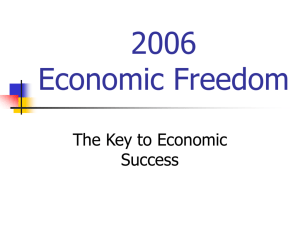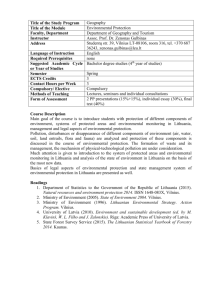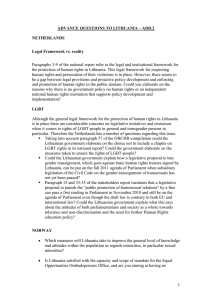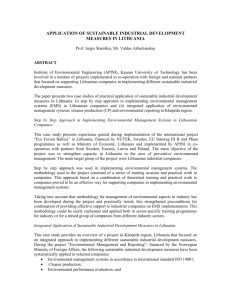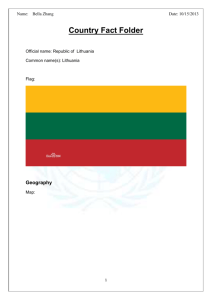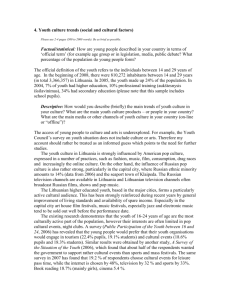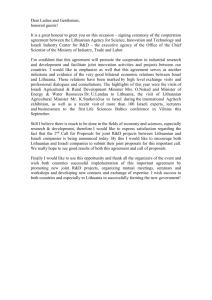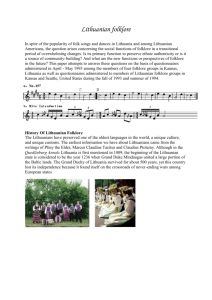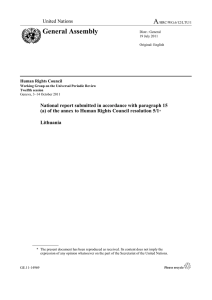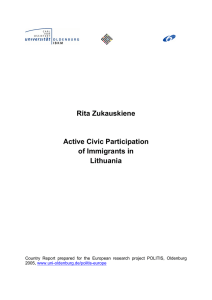Input The Impact of Cultural and Citizenship Education on Social Cohesion
advertisement
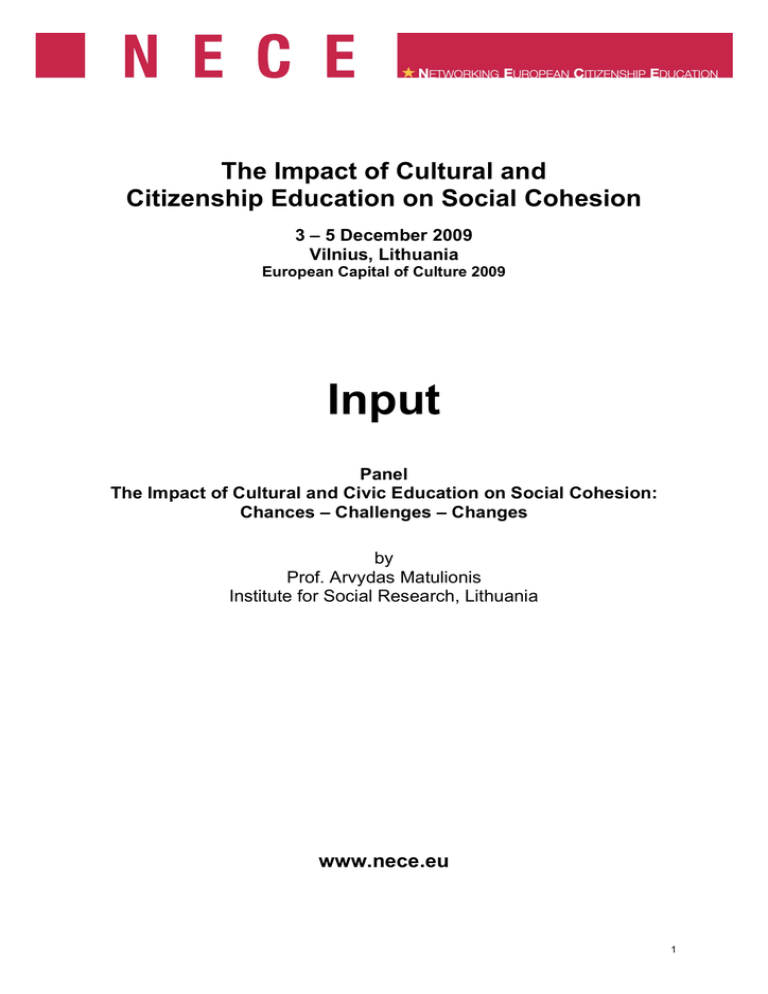
The Impact of Cultural and Citizenship Education on Social Cohesion 3 – 5 December 2009 Vilnius, Lithuania European Capital of Culture 2009 Input Panel The Impact of Cultural and Civic Education on Social Cohesion: Chances – Challenges – Changes by Prof. Arvydas Matulionis Institute for Social Research, Lithuania www.nece.eu 1 At this conference we will discuss topics concerning culture, education, citizenship, identity and cohesion, which are relevant to every country and every person. This is the reason why I will also try to give a short overview of some of the social processes and changes that have been going on recently in Lithuania. After Lithuania had restored its statehood, cardinal structural and systemic changes occurred in all fields of life – such as the establishment of market economy and the development of civil society. Almost twenty years have passed since the beginning of these changes, so we may speak of the end of the transformation period and may try to evaluate what has been right or wrong. The problems that threaten social cohesion in Lithuania are those following: - After Lithuania had regained its independence, also the system of education was radically changed. The orientation was towards the western model and the role of gymnasiums (grammar schools) was emphasized. - General education at secondary schools lost its main function of transmitting the heritage of world culture in order to educate creative individuals. Too early specialization forms one-dimensional personalities: they know how to count but do not know where Kazakhstan is; they know how to read but do not know how to sing; they know how to use computers but lack good manners and communication skills. - Other problems can also be identified in general education. As children change their schools more often, a sense of belonging to the community is not well developed. This belonging is necessary for the development of a civil society. There is no “your school” left and there are no “your schoolmates” around. Part of the youth does not receive a general education certificate, especially if they come from socially disadvantaged families or from Sinti and Roma families. The social exclusion of such youths is emerging. - Small schools in villages are being closed simply for economic reasons or to achieve better quality – similar to the USA for example, the yellow buses now take schoolchildren to larger schools. However, this sometimes means that the family also leaves a small locality, as there is no school their children could attend. Structures are ruined and communities that have been existing for centuries disappear. The local identity is „moved“ and „uprooted“. - The system of extra curricular activities has also changed. For example, sports schools have been privatized and lost part of their learners. Sometimes the pupils at such schools are influenced by criminal structures as these use these schools to recruit their members. - Lithuania as well as Latvia and Estonia are singing countries. The folk song festivals they organize have long-rooted traditions which are considered part of the world heritage. Their struggle for independence is described in terms of singing revolutions. In these countries a system of musical education was created: music schools and special music schools existed. Thousands of learners received a general cultural background. The most talented were orientated at choosing artistic activities as a profession, starting from music school to music college and music academy. Recently, for economic reasons this system has been disrupted and vital elements of it are lost. 2 - The preparation of high-level professionals at the Lithuanian Academy of Music and Theatre was affected by the new law on education and its reform. This reform introduced a student voucher based system, including fees for studying. The voucher is given only to those students at secondary schools who show the best academic achievements in their final exams. Studying music is very expensive, as it is based on one-to-one instructions. This is the reason why students who did not receive the voucher cannot decide to study and pay the full price – no matter how talented they are. They have the possibility to take bank loans, but the interest rates discourage them from doing so. - Problems also emerge when studying is financed by different projects of EU funds, which discourage part of the students to choose a broader field of education. As long as the problems of the main fields of studying are not solved, such specific aspects do not allow for the achieving a higher degree of efficiency. I am not opposing innovations in general, but innovations should not disrupt the fundamentals. - The impacts of economic recession correspond with the demographic crisis, and this makes the situation even worse. Most decisions are based on purely economic considerations. - Most things are now shifted from central to local authorities, which lack the financial resources. We cannot restrict ourselves to analyzing only negative aspects of society. We also have to take into account positive things: - A great deal of attention is attracted by schools dominated by one ethnic group; e.g. Jewish and Belarussian schools. If in Soviet times Poles used to attend Russian schools because they were supposed to provide better education, then now Poles are more willing to attend Polish schools. Lithuania does not experience problems with Russian education. These problems are rather seen in Latvia and Estonia. - As I have already mentioned, some problems are caused by the system of general education, but anyhow Lithuanian learners successfully participate in various international competitions and win them or get high evaluation. - A few decades ago we only had the opportunity to study in Leningrad or Moscow and now the whole world is open. - We live in a consumerist society and the television is very commercialized however some competitions bring up new talents. For example, for two years now we have the “Triumph Arc” contest where classical singers compete. The structure of this competition includes a special training facility where the professors of Lithuanian Academy of Music and Theatre train amateur singers (there were cases when school teachers or even farmers went on stage) This contest is watched by thousands of people on television. - Lithuania is known for its choirs that have won many competitions abroad, all significant dates are commemorated by the national song festivals. In 2009 thousands of singers gathered in Vingio Park (which is a traditional place of folk festivals) and were united by the spirit of national identity. During the Soviet period, ethnographic folk music and dance groups were the main actors in promoting Lithuanian traditions. This movement is still alive. And it is significant to rural communities. The national traditions of ethnic groups are also - 3 fostered through the activities of such ethnographic groups. The most active are Polish, Karaim, Jewish, Tartar and other communities, which together created social cohesion. - The idea of lifelong learning is being implemented. This is not only about qualifications for the world of work but has a much broader idea: intercultural education. For almost a few decades the third age university has been implementing the aim to satisfy the need for new knowledge and communication for thousands of people. I would like to finish my presentation with one remark: by competing with Estonians efforts were taken to create the image of Lithuania. Experts developed the idea of a brave and daring country. In my opinion the creation of such an image is meaningless, but Lithuania is a country of creative people. 4
